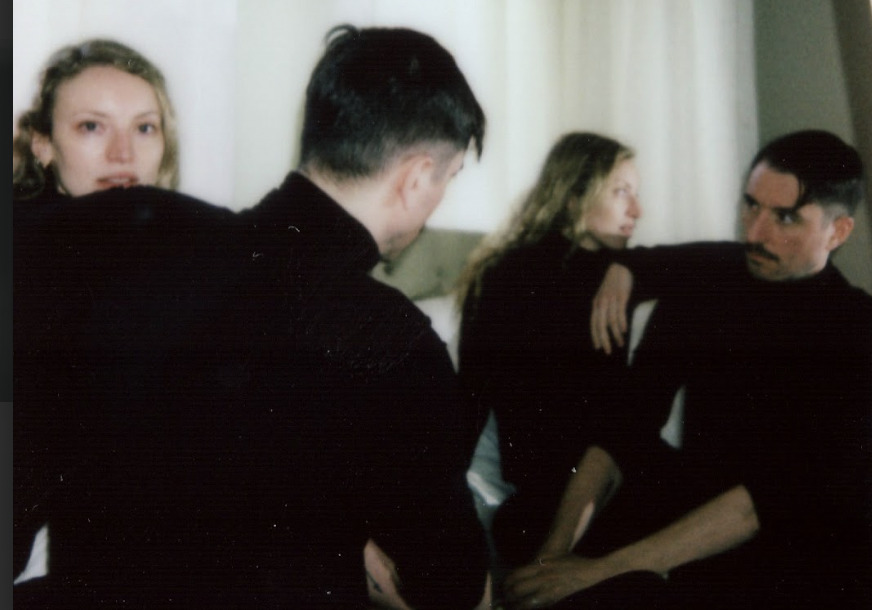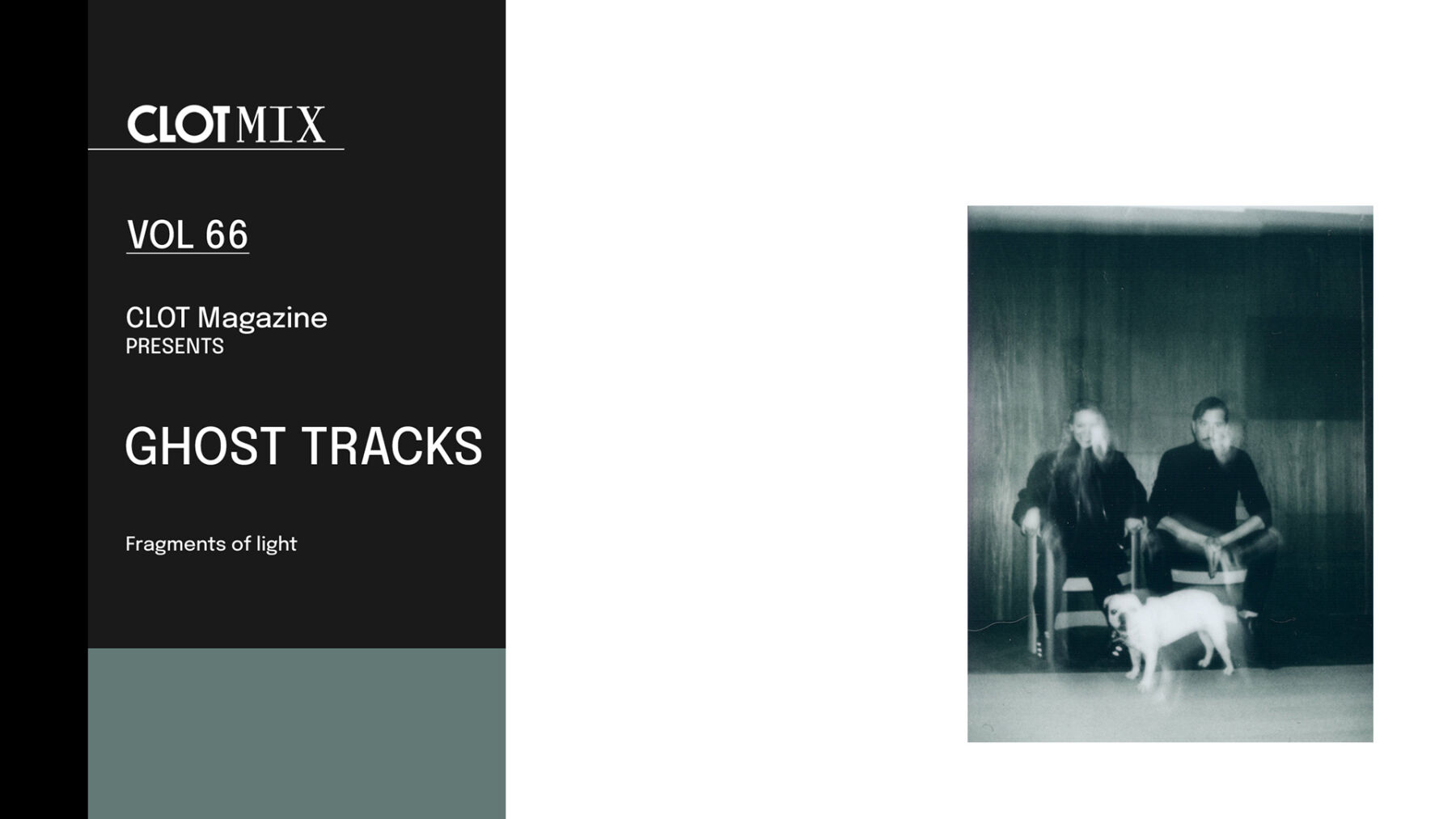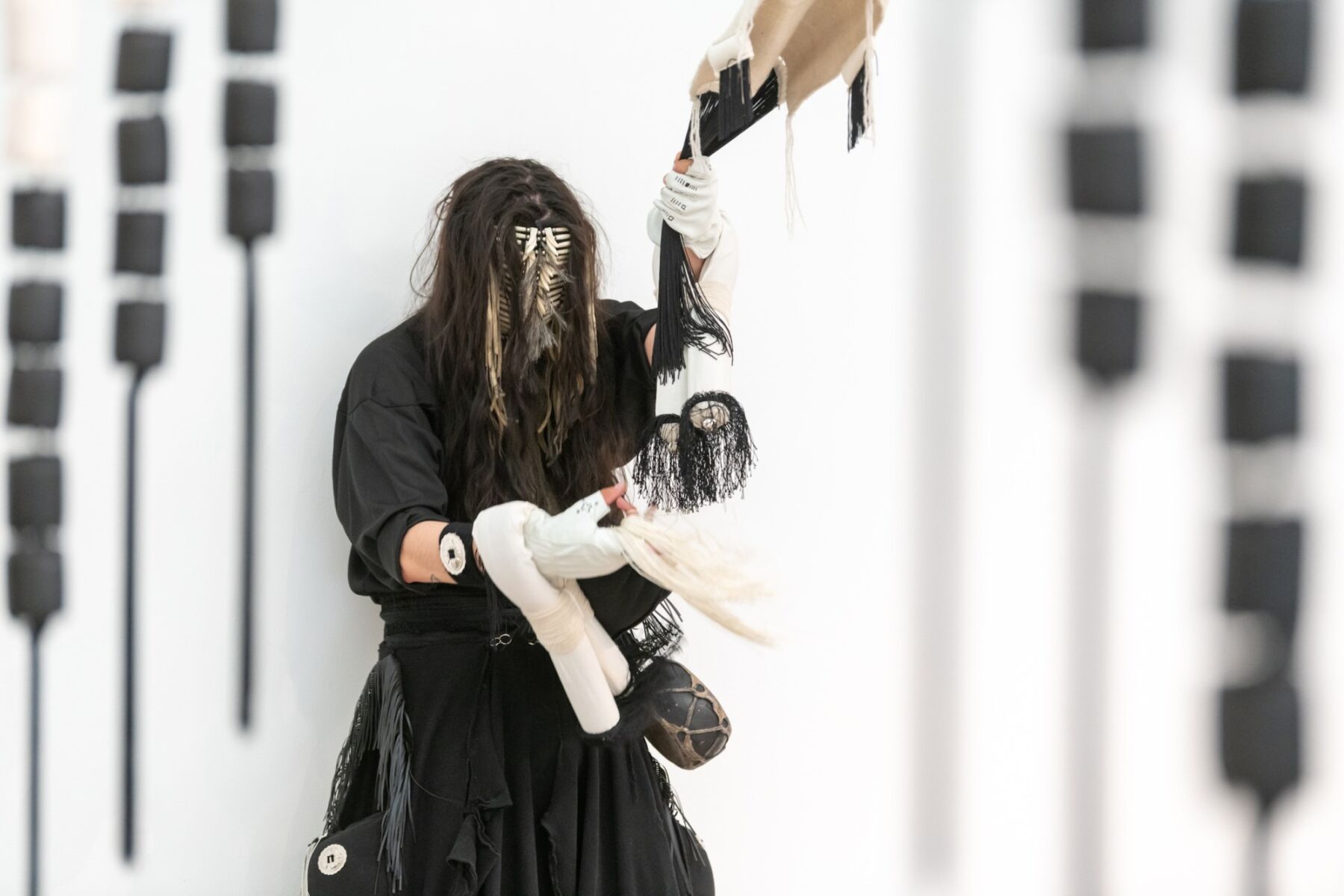Text by CLOT Magazine

This week’s mixtape comes from the multidisciplinary music/art project Ghost Tracks. They are a wife/husband team, Sylvia Girstmair and David Lopez, originally from Austria and Spain, they came together around the creative scenes of East London. This happy home life hasn’t led to a place of musical complacency for the duo, though, who also run the experimental music label Cluster Node.
Drawing upon their shared experiences in the art and music scenes, throughout the years, they have cultivated a passion for creating cinematic narratives through their music and visuals. With acoustic and electronic instrumentation, soiled traces of noise and mixed modes of experimentation, their songs present a peculiar intimacy and effortlessness.
Ghost tracks sit between melancholically sombre lulls and eerie soundscapes, aiming to create sci-fi soundtracks that evoke vivid and immersive imagery of futuristic dreams and imaginary worlds.
Now, fresh from a triumphant opening of CLOT and Cluster Node’s PORTALS showcase and presenting here a mix of their own tracks and works in progress alongside artists who inspire them: we are most excited about mixing tracks from artists that we really like and think convey a similar emotion. We tried to keep it cohesive and stick to the Fragments of Light theme.
Could you tell us a bit about your creative process when working with Ghost Tracks?
I see Ghost Tracks as a space for creating imaginary worlds and soundtracks for them. From the inception of the project, we wanted it to be deeply rooted in world-building and storytelling.
Normally it starts with a theme or a question, often drawn from speculative futures and sci-fi concepts. Then comes a period of research, delving into the conceptual foundation of the concept and idea generation. The aim isn’t solely to produce a set of songs but rather to craft an entire narrative that’s rich in emotional resonance.
Currently, I’m working on a project that revolves around a question that I have been pretty fixated on lately: How will organised religion transform when humans have ventured beyond Earth? This theme sparks a plethora of questions and speculations inside my head.
What would belief systems look like in the vast expanse of space, free from the confines of our home planet? How might spirituality evolve in the face of interstellar travel and the challenges of establishing new colonies? What are the shifts in human consciousness and cultural paradigms that such a scenario might entail?
I find these topics fascinating as they involve many different fields like sociology, anthropology, speculative fiction, and philosophy.
This initial phase of daydreaming, reading, and getting immersed in those realities is akin to laying the foundation of a building upon which creative work can flourish. This world-building process is as integral to Ghost Tracks as the music itself. After a few days, I end up in my studio surrounded by books, magazines and a board on my wall full of snippets and photos printed that look pretty much like a detective or a conspiracy theorist wall.
It may sound convoluted, but I really enjoy this process, and I believe the whole thing really ends up reflecting in the music, even if it’s at an abstract and subconscious level. Small details in a song, small creative decisions, and entire ideas about the structure of a melody or a particular instrument are informed by it. When we finish a set of tracks, our hope is that they serve as a conduit, taking the audience away into alternate realms of experience.
More on the technical side, what do you like to explore with the Ghost Tracks productions?
We combine guitar, bass, synths and percussions with sampling and sound design.
Lately, I’m particularly excited about sample manipulation. I work with bits of audio that, for one reason or another, are inspiring to me (normally related to the narrative aspect I mentioned before), transform them into something new and then tune them into the scale that I want to use for that song.
I also like to add to the implied narrative by adding field recordings that are in one way or another related to the concepts we are working on, mostly downloaded from the internet from places like aporee.org, archive.org and others. There is something really exciting and almost voyeuristic about transporting yourself to a moment encapsulated in time and then using that as a brushstroke to continue building your own imaginary world.
We end up with a collage of samples from movies or other forms of media and field recordings that are thematically linked to the overarching concept of the album. Like a mosaic of sounds, each contributing to the creation of our imaginary world. It’s a process akin to weaving together threads from different dimensions of storytelling, ultimately forming a sonic tapestry.
On top of this foundation, we add layers of instrumentation, either guitars, synths, strings, vocals, etc. Whatever feels right for the song, we try not to follow a very prescriptive approach.
The technical side always serves as a means to enhance and bring to life the creative, narrative and worldbuilding elements of that particular project.
What are your main inspirations for your artistic practice these days? What have you been most excited about recently?
I’ve been really deep into sci-fi literature, particularly the works of Soviet (and the rest of the ex-eastern bloc) authors. One of the pieces that has profoundly resonated with me over the last few years is Roadside Picnic by the Strugatsky brothers, which inspired the film Stalker directed by Tarkovsky and the S.TA.L.K.E.R. videogame of 2007 by GSC.
The three of them are pivotal works in their own mediums. Similarly, Solaris by Lem has left a mark on me. While I’ve also delved into a variety of American and Chinese sci-fi and speculative fiction, there’s something about the ex-eastern bloc authors and their approach to the genre that I find particularly mesmerising.
In comparing, for example, Solaris with Arthur Clarke’s 2001: A Space Odyssey (and their respective film adaptations by Kubrick and Tarkovsky), it becomes evident that they represent two fundamentally divergent worldviews. The American approach often revolves around the triumph of humanity, overcoming challenges, and conquering of the unknown. It’s grounded in a strong, anthropocentric, and imperialist perspective.
On the other hand, Slavic science fiction is rooted in existentialism. Its characters confront the enigma of unknown, alien realities, engaging in questions about the very nature of reality, the subjectivity of perception, and the vast ontological mysteries that define existence. It’s a contemplative side of science fiction that delves into the depths of human consciousness and our relationship with the vastness of the universe itself. I’m fascinated by it.
This mildly obsessive period has definitely seeped into the creative process of Ghost Tracks from both conceptual but also aesthetic points of view.
Other than that, I have also been enjoying a lot of music by a variety of new and established artists like Rachika Nayar, Tim Hecker, Suzanne Ciani, Voice Actor, Spivak, Sarah Davachi and Adela Mede, to name a few.
Are you planning a new release soon? If so, could we hear more details about it?
We have a few releases planned for the coming months, and we are really excited about all of them. We are contributing a song to the new compilation To Light a Candle is to Cast a Shadow, released soon on Cluster Node alongside some amazing artists like Bianca Scout, James K, Spivak, Chantal Michelle, An Trinse and others. We think it’s a beautiful album with amazing art by Stephen McLaughlin; it will be released on the 22nd of November in digital and cassette.
Our first album is being released also on Cluster Node. It is the first chapter in a two-part series, narrating the tale of the ‘Boreas Dominus,’ a story placed in an otherworldly iced landscape, a research station, and the final days of a stranded person.
This one was inspired by a particularly dark period we both went through some time ago, feelings of isolation, existential dread, and also finding beauty in that darkness, which somehow reminded us of the captivating yet eerie beauty of natural frozen landscapes. We built a story located in an imaginary space called the ‘Boreas Dominus’, a large extension of barren terrains where desolate expanses and the haunting echoes of howling winds dominate.
These spaces, much like the journeys and some particularly painful episodes we all go through, can be simultaneously eerie, tranquil, and enthralling. They leave a lasting impression in our memories—a peculiar beauty that lingers long after.
In addition to these, we are now finishing another release that will see the light early next year.
What is your relationship with technology nowadays? And how do you cope with technology (screen/digital) overload?
We are surrounded by technology from the moment we are born. From the wheel to artificial intelligence. It is an intrinsic part of our lives and completely embedded in our cultures. Interestingly, we tend to distinguish and label only the most modern or recent technologies as “technology” itself.
I think this is because we’re in the ongoing process of assimilating them into our daily lives, much like we did with all the other forms of technology in the past (like writing or a knife) that have become virtually invisible in our routines. It is a testament to our remarkable capacity to adapt and mutate as a species.
On the other hand, I have, like probably most do, reservations about the rapid pace of technological development, in particular in the field of generative artificial intelligence, within the framework of neoliberal exploitative capitalism we live in.
Developments like these tend to outpace our ability to fully understand its implications, especially in terms of social, economic, and ethical dimensions. It’s crucial that we critically examine and question the motives behind its deployment, ensuring that it serves the collective good rather than perpetuating inequalities or serving the narrow, profit-driven interests of the few.
We both deal with screen overload by running, cycling, meditating and mostly going to the pub with friends.






